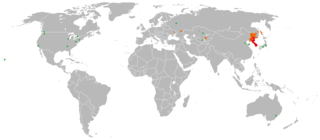ਕੋਰੀਅਨ ਭਾਸ਼ਾ
ਦਿੱਖ
| ਕੋਰੀਅਨ | |
|---|---|
| 한국어 (ਦੱਖਣ ਕੋਰੀਆ) 조선말 (ਉੱਤਰ ਕੋਰੀਆ) | |
| ਉਚਾਰਨ | [han.ɡu.ɡʌ] / [tɕo.sʰʌn.mal] |
| ਜੱਦੀ ਬੁਲਾਰੇ | ਕੋਰੀਆ |
| ਨਸਲੀਅਤ | ਕੋਰੀਅਨ ਲੋਕ |
Native speakers | 77,233,270 (2010)[1] |
Early forms | |
ਮਿਆਰੀ ਰੂਪ | |
| ਉੱਪ-ਬੋਲੀਆਂ | ਕੋਰੀਅਨ ਉਪ-ਭਾਸ਼ਾਵਾਂ |
| Hangul (primary) Hanja Romaja ਕੋਰੀਅਨ ਬਰੇਲ | |
| ਅਧਿਕਾਰਤ ਸਥਿਤੀ | |
ਵਿੱਚ ਸਰਕਾਰੀ ਭਾਸ਼ਾ | ਫਰਮਾ:ROK ਫਰਮਾ:DPRK |
ਮਾਨਤਾ-ਪ੍ਰਾਪਤ ਘੱਟ-ਗਿਣਤੀ ਵਾਲੀ ਬੋਲੀ | |
| ਰੈਗੂਲੇਟਰ | The Language Research।nstitute, Academy of Social Science 사회과학원 어학연구소 / 社會科學院 語學研究所 (Democratic People's Republic of Korea) National।nstitute of the Korean Language 국립국어원 / 國立國語院 (Republic of Korea) China Korean Language Regulatory Commission 중국조선어규범위원회 中国朝鲜语规范委员会 (People's Republic of China) |
| ਭਾਸ਼ਾ ਦਾ ਕੋਡ | |
| ਆਈ.ਐਸ.ਓ 639-1 | ko |
| ਆਈ.ਐਸ.ਓ 639-2 | kor |
| ਆਈ.ਐਸ.ਓ 639-3 | Variously:kor – ਮਾਡਰਨ ਕੋਰੀਅਨjje – Jejuokm – ਮੱਧਕਾਲੀ ਕੋਰੀਅਨoko – ਪੁਰਾਣੀ ਕੋਰੀਅਨoko – ਪ੍ਰੋਟੋ-ਕੋਰੀਅਨ |
okm ਮੱਧਕਾਲੀ ਕੋਰੀਅਨ | |
oko ਪੁਰਾਣੀ ਕੋਰੀਅਨ | |
| Glottolog | kore1280 |
| ਭਾਸ਼ਾਈਗੋਲਾ | 45-AAA-a |
 Countries with native Korean-speaking populations (established immigrant communities in green). | |

ਕੋਰੀਅਨ ਭਾਸ਼ਾ ਏਸ਼ੀਆ ਦੇ ਦੋ ਮੁਲਕਾਂ ਉੱਤਰੀ ਕੋਰੀਆ ਅਤੇ ਦੱਖਣੀ ਕੋਰੀਆ ਦੀ ਸਰਕਾਰੀ ਭਾਸ਼ਾ ਹੈ। ਦੁਨੀਆ ਵਿੱਚ ਕਰੀਬ ਸੱਤ ਕਰੋੜ ਅੱਸੀ ਲੱਖ ਲੋਕ ਕੋਰੀਅਨ ਬੋਲਦੇ ਹਨ।
ਇਤਿਹਾਸਿਕ ਅਤੇ ਆਧੁਨਿਕ ਭਾਸ਼ਾ ਵਿਗਿਆਨੀਆਂ ਮੁਤਾਬਕ ਇੱਕ ਵਿਯੋਜਕ ਭਾਸ਼ਾ ਹੈ।[2][3][4][5][6][7]
ਹਵਾਲੇ
[ਸੋਧੋ]- ↑ ਫਰਮਾ:Ethnologue17
- ↑ Song, Jae Jung (2005), The Korean language: structure, use and context, Routledge, p. 15, ISBN 978-0-415-32802-9.
- ↑ Campbell, Lyle; Mixco, Mauricio (2007), "Korean, A language isolate", A Glossary of Historical Linguistics, University of Utah Press, pp. 7, 90–91,
most specialists... no longer believe that the... Altaic groups... are related […] Korean is often said to belong with the Altaic hypothesis, often also with Japanese, though this is not widely supported
. - ↑ Dalby, David (1999 – 2000), The Register of the World's Languages and Speech Communities, Linguasphere Press
{{citation}}: Check date values in:|year=(help)CS1 maint: year (link). - ↑ Kim, Nam-Kil (1992), "Korean", International Encyclopedia of Linguistics, vol. 2, pp. 282–86,
scholars have tried to establish genetic relationships between Korean and other languages and major language families, but with little success
. - ↑ Róna-Tas, András (1998), "The Reconstruction of Proto-Turkic and the Genetic Question", The Turkic Languages, Routledge, pp. 67–80,
[Ramstedt's comparisons of Korean and Altaic] have been heavily criticised in more recent studies, though the idea of a genetic relationship has not been totally abandoned
. - ↑ Schönig, Claus (2003), "Turko-Mongolic Relations", The Mongolic Languages, Routledge, pp. 403–19,
the 'Altaic' languages do not seem to share a common basic vocabulary of the type normally present in cases of genetic relationship
.
ਸ਼੍ਰੇਣੀਆਂ:
- CS1 errors: dates
- CS1 maint: year
- Articles containing Korean-language text
- Pages with plain IPA
- Articles containing English-language text
- Articles containing Chinese-language text
- Languages with Linglist code
- Languages with ISO 639-2 code
- Languages with ISO 639-1 code
- ISO language articles citing sources other than Ethnologue
- ਭਾਸ਼ਾਵਾਂ
- ਦੱਖਣੀ ਕੋਰੀਆ ਦੀਆਂ ਭਾਸ਼ਾਵਾਂ
- ਉੱਤਰੀ ਕੋਰੀਆ ਦੀਆਂ ਭਾਸ਼ਾਵਾਂ
